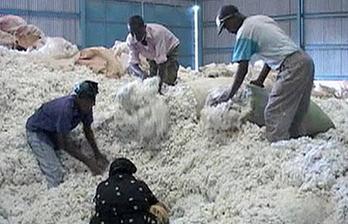
This is the VOA Special English Agriculture Report.
Real estate agents usually handle property sales for other people. But ten years ago David Masika, an agent in Kenya, bought a cotton mill for himself.
The mill was Makueni Ginneries in Eastern province. It was operating with technology from the 1960s. It produced only 200 kilos of cotton in its first year under new ownership.
Last year Makueni Ginneries sold 600,000 kilos, or about 1,000 bales. It made its first profit since Mr Masika bought it.
Business is good -- world prices for cotton are up. But David Masika worried that he might not have enough cotton to process if he invested in new technology.
DAVID MASIKA: "We got into this vicious circle where we then were wondering, do I completely modernize this thing when I do not know whether the cotton is coming?"
Makueni is one of only four modern ginneries in the country. Kenya's cotton industry used to be strong. But almost 20 years ago a government agency collapsed. That agency had provided growers with a guaranteed price for cotton. Without that support, prices fell and so did production.
Today, Kenya is part of the African Growth and Opportunity Act. AGOA is an American law first signed in 2000. The goal is to help strengthen African economies by expanding American markets. It provides duty-free and quota-free treatment for certain clothing and other products.
Kenya says its clothing exports tripled from 2001 to 2006. But Kenya's cotton and textile industry is concerned about meeting future requirements of the law.
AGOA countries have been operating under what is called a third-country fabric provision. This lets them use yarns and fabrics made in any country, not just AGOA countries. But starting next September those countries must be able to find the raw materials for their products regionally.
Kenya's cotton industry wants the United States Congress to extend the third-country fabric provision. Micah Powon is chief executive of the Cotton Development Board.
MICAH POWON: "If [we get] an extension period of two or three years by AGOA, I confidently say that we will be able to produce enough cotton to meet local demand to qualify for the AGOA market."
African countries face not only a limited cotton supply and poor machinery. They also face problems with making cotton into fabric to produce clothing. Under AGOA, fabric is considered a raw resource that has to come from African countries instead of places like China.
And that's the VOA Special English Agriculture Report, written by Jerilyn Watson. I'm Jim Tedder.
Drought threatens Turkana way of life in Kenya
Africa's bright, dark economic spots get attention
African finance ministers discuss economic recession
Experts defend way of life for herders in East Africa
(來源:VOA 編輯:張若瓊)
